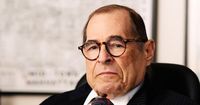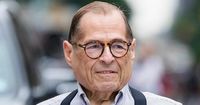On September 1, 2025, Representative Jerry Nadler, a fixture of New York politics and the longest-serving New Yorker in the House of Representatives, announced that he will not seek reelection in 2026. After 34 years representing Manhattan and serving as a liberal stalwart in Congress, Nadler’s decision is sending ripples through the Democratic Party and the political landscape of New York.
Nadler, 78, has long been a defining voice on Capitol Hill, especially on issues of civil rights and the rule of law. He chaired the powerful House Judiciary Committee from 2019 to 2023 and played a central role in three presidential impeachments, including both historic proceedings against President Donald Trump. As the longest-serving Jewish member of the House, his departure marks the end of an era for his district and for the broader Democratic caucus.
But why now? In an interview published by The New York Times, Nadler was candid about the forces shaping his decision. He pointed directly to the events of the 2024 presidential race, particularly the fallout from President Joe Biden’s rough debate performance and subsequent withdrawal from the race. "Watching the Biden thing really said something about the necessity for generational change in the party, and I think I want to respect that," Nadler told The New York Times. He elaborated that a younger successor "can maybe do better, can maybe help us more."
Nadler’s remarks reflect a growing sentiment within the Democratic Party: a recognition that the era of senior leadership may be giving way to a younger, more energetic generation. While Nadler was quick to clarify, "I’m not saying we should change over the entire party," he maintained, "But I think a certain amount of change is very helpful, especially when we face the challenge of Trump and his incipient fascism." (POLITICO and The Guardian both reported these comments.)
His decision didn’t come lightly. Nadler admitted to hesitating, especially as he believes former President Trump continues to threaten the foundations of American democracy. "I had previously hesitated to step aside at a time when I believe Trump is threatening the basis of US democracy," he told The Guardian. Yet the push for generational change, coupled with the Democratic Party’s recent losses in the White House, House, and Senate, ultimately persuaded him.
Back home, the winds of change were already blowing. Nadler’s Manhattan district, one of the wealthiest and most reliably Democratic in the country, was poised for a shakeup. He faced a primary challenge from 26-year-old Rhodes scholar Liam Elkind, who told CBS News, "We need to be the party of fighters. We need to be the party of organizers. We need to be more generationally relevant, better organized and ready to fight." Elkind’s candidacy was emblematic of a broader movement among younger, more progressive Democrats eager to take the reins.
Nadler’s influence in Washington had already begun to wane. At the start of the current Congress, he was removed from his role as the top Democrat on the House Judiciary Committee, a move widely interpreted as a signal that the party was ready for younger leadership. Rep. Jamie Raskin of Maryland launched a bid to unseat Nadler as ranking member, further underscoring the generational shift underway.
Despite these changes, Nadler’s impact on American politics is undeniable. He was a manager during Trump’s first impeachment and helped shepherd legislation such as the Respect for Marriage Act. House Minority Leader Hakeem Jeffries praised Nadler as "a relentless fighter for justice, civil rights and liberties and the fundamental promise of equality for all." Jeffries added, "As the legendary Chairman of the powerful House Judiciary Committee, he helped lead two historic impeachments and ensure that no one, not even the President, is above the law." (CBS News)
The announcement of Nadler’s retirement is expected to trigger a fierce contest for his seat. His district, encompassing a significant swath of Manhattan, is considered one of the bluest in the nation. As NBC News and POLITICO reported, the prospect of an open seat in such a deep-blue district is likely to attract a crowded field of ambitious Democrats, eager to stake their claim in a rare opportunity.
Some observers note that Nadler’s move could be seen as a challenge to other senior Democrats to consider stepping aside. He told The New York Times, "I think a certain amount of change is very helpful," and suggested—without naming names—that other aging Democrats might follow his lead. However, as NBC News pointed out, the House Democratic caucus still includes a large number of members over 70, far more than their Republican counterparts. Three House Democrats have died in the current year alone, a stark reminder of the aging leadership at the party’s helm.
Nadler’s decision also comes at a time of heightened competition within New York’s Democratic ranks. The state is home to a new generation of progressive leaders. Notably, Nadler was quick to embrace democratic socialist Assemblyman Zohran Mamdani after his surprise victory in the New York City Democratic mayoral primary, signaling openness to the party’s evolving identity.
In his statement to the public, Nadler expressed both pride and a sense of responsibility. "But I know in my heart it is the right one and that it is the right time to pass the torch to a new generation," he said. "I don’t know what the future beyond 2026 holds, but I plan to stay fully engaged in the community that is my home and in the causes that I’ve championed throughout my life." He assured constituents that for the next sixteen months, he would "continue to give everything I have to defend our democracy, protect our institutions, and fight for the values that as Americans and New Yorkers we share."
As for who might succeed him, speculation is already swirling. The Guardian cited sources familiar with Nadler’s thinking who suggested he might endorse former aide Micah Lasher, 43, though Nadler himself has not made any public endorsement.
One thing is certain: Jerry Nadler’s retirement marks the end of a storied congressional career and the beginning of a new chapter in New York politics. As the Democratic Party grapples with calls for generational renewal, Nadler’s decision could set a precedent for others—though, as history shows, the wheels of change in Washington never turn quickly or predictably.


